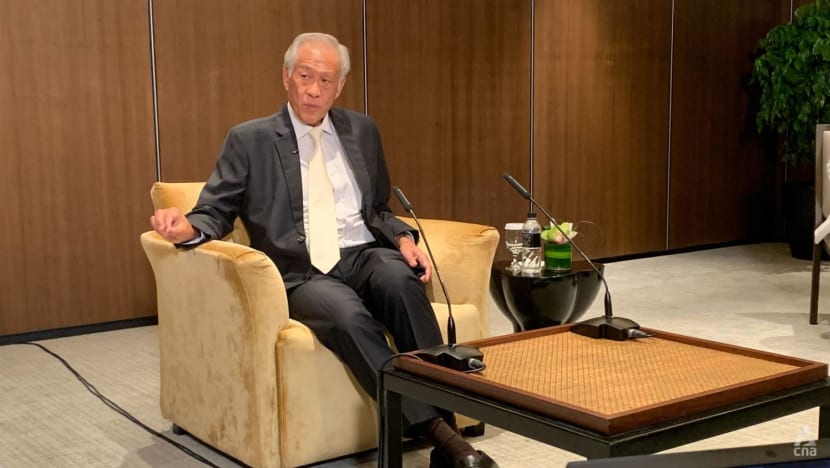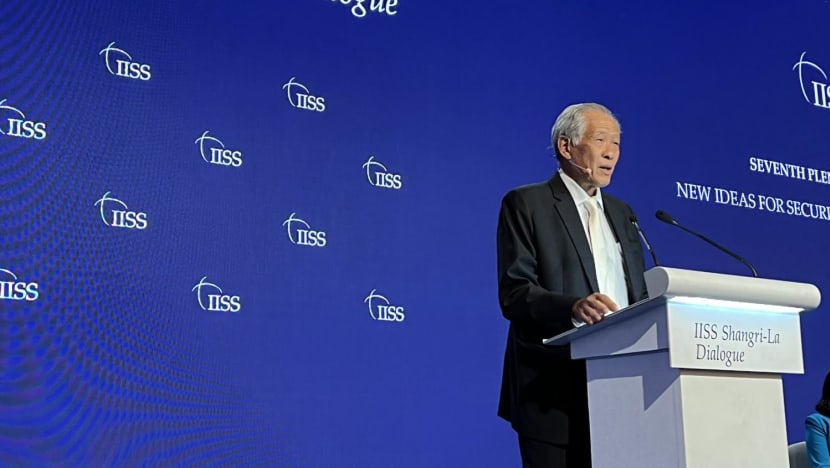US-China relations too complex to improve in a single meeting: Ng Eng Hen

Defence Minister Ng Eng Hen speaking to the media in his Shangri-La Dialogue wrap-up interview on Jun 12, 2022. (Photo: CNA/Aqil Haziq Mahmud)
SINGAPORE: Improving relations between the United States and China is an issue that is "too complex" to be resolved in one meeting like the Shangri-La Dialogue (SLD), Singapore's Defence Minister Ng Eng Hen told reporters on Sunday (Jun 12).
This comes after US Defense Secretary Lloyd Austin and Chinese Defence Minister Wei Fenghe met face to face for the first time on Friday, the first day of the premier security summit, and traded barbs in their own speeches delivered on Saturday and Sunday.
Mr Austin and General Wei clashed over the issue of Taiwan, before the US Defense Secretary said on Saturday that China was becoming more "coercive and aggressive".
General Wei on Sunday called on the US to stop "smearing and containing" China, and accused a "big power" of practising "navigation hegemony" in the South China Sea.
Related:
Wrapping up three days of the dialogue on Sunday, Dr Ng said the fact that Mr Austin and General Wei met still "gives some comfort".
"Has their meeting and has their engagements improved the US-China relations? I think that would be a stretch. One meeting wouldn't change it," he said.
"Would it give pause and give reflections on both sides to say: I know my goals, we know our differences. How do we take the next step? At least where they agree to disagree on is very clear, for example, Taiwan."
Member states of the Association of Southeast Asian Nations (ASEAN), some of which have contesting claims with China in the strategic South China Sea, will continue working with US and China within the ASEAN Defence Ministers’ Meeting (ADMM)-Plus, Dr Ng said, noting that its next meeting will be held at the end of the year.
The ADMM-Plus is a platform for ASEAN and its eight partners – Australia, China, India, Japan, New Zealand, South Korea, Russia and the United States – to strengthen security and defence cooperation in the region.
"This is a conversation, this is a journey. This is the reality, and that would be how I would characterise it is there's no summative experience or no summative conclusion," Dr Ng said.
"It's just too complex a problem. I mean, the Cold War took a good part of 50 years, so why should you expect this to be resolved within a couple of decades?"
Still, Dr Ng called for an "expeditious conclusion" to negotiations between ASEAN and China on the Code of Conduct (COC) in the South China Sea, highlighting that the document could be key to navigating claims in the disputed waterways.
Related:
For many years, ASEAN and China have been jointly working on the code of conduct to prevent tensions in the South China Sea from spiralling into open conflict. In November 2018, Chinese Prime Minister Li Keqiang expressed hope that the document will be completed in 2021.
"(It is) not only my wish for the COC, the prime minister of China has said he wanted to conclude it. In fact he gave a deadline, but the deadline is over. He said three years, and he said it publicly," Dr Ng said.
"So, I suppose COVID slowed them down. But their prime minister has spoken. The COC is necessary. It is the document that may give clarity, transparency to form a code of conduct as well as rulebook so that everybody understands, in a sense, how it is supposed to operate.
"So, it's crucial, in my mind. That obviously depends on what it finally is, but it is the next concrete step. So we can argue about all the problems but the COC is the central instrument at this point," Dr Ng added.
"I hope that we can pick it up as the pandemic resolves."

Nevertheless, Dr Ng had earlier acknowledged that China is the top trading partner for almost all Asian countries, and so Asia must strengthen existing establishments like the ADMM-Plus for security.
"The ADMM-Plus can continue to set norms and establish mechanisms to de-escalate and avert conflict," Dr Ng said during his plenary speech, citing ground rules the group established to de-escalate unplanned encounters among naval vessels and military aircraft.
Countries like Canada and France have also expressed interest in joining ADMM-Plus construct, and Dr Ng said in his wrap-up interview that the ministers in the group have agreed in principle to their requests.
"In principle for more observers like Canada or France wanting to be a part of it, I think we are in agreement," he said.adding that the group's 10 plus eight countries was "never meant to be the end point”.
"We agreed because we think their presence adds to the stability.”
Some practical arrangements, like having the new members sign the Treaty of Amity and Cooperation and their militaries take part in joint exercises, will still need to be resolved.
"We are at the stage where you have to work out how do you digest this? You don't want to have indigestion or in practical terms where you're a member but there is no activity. That's not what we are after," Dr Ng said.
RUSSIA-UKRAINE WAR
Moving on to questions about Russia's invasion of Ukraine and whether the dialogue has contributed to a resolution, Dr Ng said the situation could be "worse off" without the meeting.
"Don't expect after a dialogue that suddenly there's a communique and say, well, there's peace, global peace. Never happened like that. Even the end of the Cold War took decades of meetings and arguments," he said.
"I think for this Shangri-La Dialogue ... you may not move as fast a pace as we like. Even for family quarrels, it's not as if you have one dinner and everything is settled among feuding brothers or sisters ... That search for compromise, that search for common ground helps in all the efforts."
On whether he thought it was the right decision for dialogue organiser the International Institute for Strategic Studies to not invite Russia, Dr Ng said this was understandable given that other meetings also did not invite Russia, while those with Russian involvement triggered walk-outs.
"How can we condemn your actions and yet give you an invitation as if nothing has happened?" he said, highlighting that this was not an easy question as countries will have fewer platforms to communicate with Russia.
"Should Russian leadership come to international fora to explain their position? Will they come? And if they come, will delegates control their passion and conduct impassionate inquiry? All are really practical questions."
Dr Ng said the war in Ukraine, coupled with the pandemic, were two forces that led the world to a "potentially dangerous point in our history".
"We hope that next year we meet under better times, but there is no guarantee, there is no certainty. But at least we are satisfied that we held SLD at this opportune time in world history," he added.
















